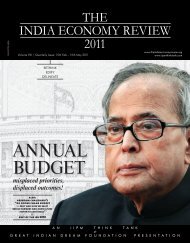Download - The India Economy Review
Download - The India Economy Review
Download - The India Economy Review
You also want an ePaper? Increase the reach of your titles
YUMPU automatically turns print PDFs into web optimized ePapers that Google loves.
ii.<br />
iii.<br />
Planning Commission should restrict<br />
itself to the formulation of perspec-<br />
tive fi ve years and annual plans, re-<br />
source assessment and evaluation and<br />
should not interfere in the implemen-<br />
tation of the plans which should be<br />
the exclusive responsibility of execu-<br />
tive agencies. It has also been argued<br />
since long that the Planning Commis-<br />
sion has encroached upon the au-<br />
tonomy of the states under the fed-<br />
eral system. This encroachment is<br />
seen in terms of the Planning Com-<br />
mission’s acceptance, modifi cation or<br />
rejection of the states proposal for<br />
development programme for which<br />
central fi nancial assistance is sought<br />
and which can be granted only on the<br />
recommendation of Planning Com-<br />
mission.<br />
<strong>The</strong> Planning Commission is not a<br />
statutory body and it does not fi nd<br />
any place in the Constitution. But<br />
that’s the case with all ministries.<br />
Over the years with the expansion in<br />
the scope of planning, its function<br />
have extended substantially and have<br />
enveloped almost the entire sphere of<br />
administration excluding only de-<br />
fense and foreign affairs. It has been<br />
alleged that because of its powerful<br />
position by virtue of the chairmanship<br />
of Prime Minister it has even en-<br />
croached upon the functions of con-<br />
stitutional bodies such as fi nance<br />
commission and yet not accountable<br />
to parliament. Even the National<br />
Development Council (NDC) which<br />
is a body responsible for the approval<br />
of plans envisaged by Planning com-<br />
mission approved it without any<br />
critical analysis of the same.<br />
<strong>The</strong> Planning Commission is built<br />
upon a heavy bureaucratic organiza-<br />
iv.<br />
tion. <strong>The</strong> Commission which was ini-<br />
tially a small body of serious thinkers<br />
had turned into government department<br />
with a crowd of secretaries, directors<br />
and big buildings. Neither the<br />
Planning Commission has been able<br />
to apply an integrated approach and<br />
actions nor coordination has been<br />
emphasized, which results in the<br />
overlapping among and duplication<br />
of efforts of various organizations,<br />
resulting in wastage of resources.<br />
<strong>The</strong>re are overlapping responsibilities<br />
between the Planning Commission<br />
and Finance Commission. Perhaps,<br />
the constitution maker could<br />
not anticipate the setting up of an<br />
extra constitutional authority in less<br />
than a couple of months after the<br />
promulgation of the constitution.<br />
Since there can be no neat distinction<br />
between plan expenditure and nonplan<br />
expenditure, so unambiguous<br />
distinction between the role of two<br />
bodies cannot be made.<br />
<strong>The</strong> votaries of liberalization and free<br />
market have been more critical to the<br />
whole concept of Planning Commission.<br />
According to them the Planning<br />
Commission should be shut down as<br />
the Finance Ministry already has a<br />
pool of talented experts. <strong>The</strong> Planning<br />
Commission only creates duplicity<br />
and lengthy procedures. Instead of<br />
Planning Commission there should<br />
be Implementation Commission<br />
which should be created under some<br />
act of Parliament. <strong>The</strong> Planning<br />
Commission has only multiplied the<br />
T RANSFORMATIVE PLANNING<br />
<strong>The</strong> Govt agreed with the view of<br />
the ARC that the Planning Commission<br />
should be a compact body<br />
schemes but has completely failed to<br />
monitor those schemes. <strong>The</strong> Planning<br />
Commission is an unnecessary burden<br />
on line ministry. It has outlived<br />
its utility. <strong>The</strong> fi nance ministry and its<br />
various offi ces and Independent<br />
regulators like Reserve Bank of <strong>India</strong><br />
(RBI) have enough talent to suggest<br />
and formulate policies.<br />
v. <strong>The</strong> Planning Commission was ini-<br />
tially set up under an executive order,<br />
probably with the aid of Article 73,<br />
which envisages that the executive<br />
powers of the union shall extend to<br />
the matters with respect to which<br />
Parliament has power to make laws.<br />
Thus Planning Commission has legal<br />
status though the constitutional status<br />
was never given.<br />
vi. Contrary to the provisions of Consti-<br />
tution, Planning Commission has<br />
started dealing with devolution of<br />
huge funds for investment of a capital<br />
nature while Finance Commission<br />
concentrated in the fi elds of revenue<br />
expenditure with of course some<br />
over-lappings. <strong>The</strong> new terms of ‘plan<br />
grants’ and ‘non-plan grants’ were<br />
then got introduced with no provisions<br />
and much less indication in the<br />
Constitution of <strong>India</strong>.<br />
vii. If we assume the whole scenario as<br />
contemplated therein, the only thing<br />
that comes to mind is that the economy<br />
of the Nation must be looked as a<br />
whole. Following the example of human<br />
eyes, one can deduce a principle<br />
that there must be convergence of<br />
vision in an unifi ed manner to have a<br />
THE INDIA ECONOMY REVIEW<br />
91





